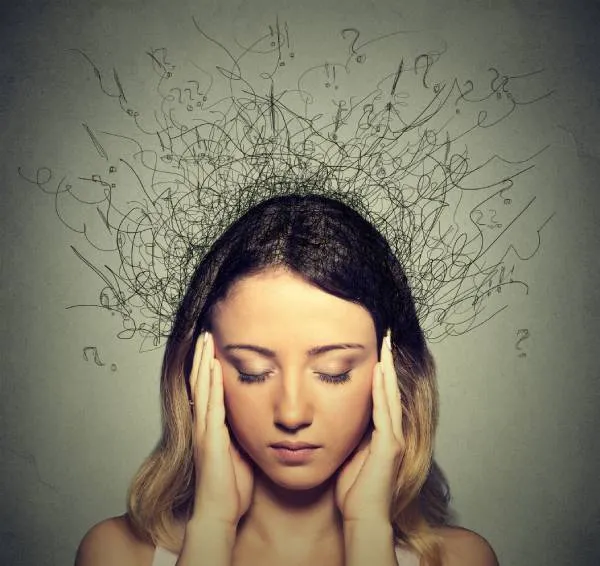
Managing Anxiety
Many people experiencing symptoms of anxiety can often feel overwhelmed by their experience. Anxiety is a feeling of unease, worry or fear that can be either mild or severe. Although you might feel alone in your experience with anxiety, everyone has feelings of anxiety from time to time or on a more regular basis in their life. It’s estimated that 1 in every 5 experience anxiety significantly at some point. Stress and anxiety are part of life, and have become more so, especially during these times of uncertainty.
Fear is one of the most powerful emotions. It has a very strong effect on your body and mind. It’s a natural response to a threat. The experience of anxiety is very similar to the experience of fear – the main difference is that anxiety occurs in the absence of real danger. That is, the individual may think that they are in danger but the reality is that they are not. For example, think of the anxiety you may feel walking down a poorly lit street alone at night. There may be feelings of anxiety because of a perceived threat of some potential danger. This doesn’t mean that there is any real danger in walking down this particular street, but what causes the experience of anxiety is the thoughts or beliefs that there is danger. Therefore, the experience of anxiety and fear are very similar in experience, except that in the case of anxiety, there may not be any actual danger – the person just has thoughts or beliefs there is.
Understanding Anxiety
Feeling afraid is very much a part of the experience of being human, it is a normal, natural response and, occurs in response to realistically anticipated danger and therefore is our survival instinct.
For example, if a ferocious animal confronted us it is likely that we would respond with fear. This response is important because it initiates a whole series of physical and behavioral changes that ultimately serve to protect us. In this example, when confronted by an animal, the feeling of fear would probably lead us to either run for our lives or become sufficiently energized to physically defend ourselves. This response has been named the fight/flight response
Fight or flight response

It is important to fully understand the way our bodies react to threat or danger, whether real or imagined. When a person is in danger, or believes that they are in danger a number of changes occur. When confronted with danger we will typically flee ‘flight’ from the situation, or stand and fight. The main purpose of the fight/flight response is to protect the individual. When a person’s fight/flight response is activated, three major systems are affected. These are the physiological, cognitive and behavioural systems.
We experience the physiological aspect of anxiety as sensations in our body. These can include a racing heart, shallow breath, lightheadedness, clammy hands, restlessness, fatigue, trembling, muscle tension, or a “lump in the throat,” as well as headaches, stomachaches, backaches, and a variety of other stress-related medical problems.
The cognitive aspect of anxiety shows up as worried thoughts about the future-imagining worse case scenarios and thinking about ways to avoid them.
The third aspect of anxiety involves avoidant behavior. Not surprisingly, we try to avoid situations that bring on unpleasant physiological reactions and painful thoughts. So when we’re anxious, we often start to limit certain areas of our lives, avoiding the activities and situations that we expect will make us more anxious. Short term this can offer some form of release, but unfortunately, in the longer term this generally makes matters worse.
When you experience fear or anxiety, your body and mind work very quickly, to protect you from the ‘threat’.
These are some of the symptoms you may experience:
- Increased heart rate – may feel irregular
- Hot and cold sweats
- Breathing very quickly
- Muscles feel weak or tense
- Sweating
- Stomach cramps or loose bowels
- Difficulty concentrating
- Feeling dizzy
- Loss of appetite
- Dry mouth

These things occur because your body, detecting fear, is preparing you to react to the situation, so it makes your blood flow to the muscles, increases bloody sugar and switches your mind to focus only on the thing that your body perceives as a threat.
Longer term anxiety issues may also include, becoming irritable, having difficulty sleeping, developing headaches, difficulty concentrating or planning for the future, you may also have experience low self-esteem or loss of confidence.
Why do I feel like this when I’m not in any real physical danger?
Our ancestors needed this fast physiological powerful response as they were often in situations of physical danger, in order to survive they needed to respond in this way. However, we no longer face the same threats in modern day life. Despite this our body and brains still work the same way as our early ancestors to more modern day worries such as money concerns, health issues or social situations.
What can help?

Fear and anxiety can affect all of us, and it’s important to acknowledge that feeling anxious during this time is normal, natural and expected. You may already have some useful tools to deal with anxiety such as mindfulness, relaxation, breathing exercises, diffusing from difficult thoughts, now would be a good time to increase these. If not, perhaps consider now might be a good opportunity to learn some, visiting a psychologist can support you with this.
If you feel anxious or worried a lot of the time or you’re finding it difficult or stressful to carry out your daily life and routines, it’s a good idea to ask your doctor and/or see a psychologist to ask for help.
Talking therapy such as cognitive behavioural therapy (CBT) have been proven to be very effective for people experiencing anxiety difficulties. CBT helps you to understand how your problems, thoughts, feelings and behaviour affect each other. It can also help you to question your negative and anxious thoughts, and do things you would usually avoid because they make you anxious. A clinical psychologist will be able to talk with you about the best and most suitable approach for you and your situation
Medication can be used to provide short-term help, rather than looking at the root of the problem. Drug treatment may be most useful when combined with psychological therapy.
Links to helpful information
www.mentalhealth.org.uk
www.anxietyuk.org.uk
www.mind.org.uk
To book an appointment with Dr. Sarah Lawson, please call 800 4272 or email at [email protected]










